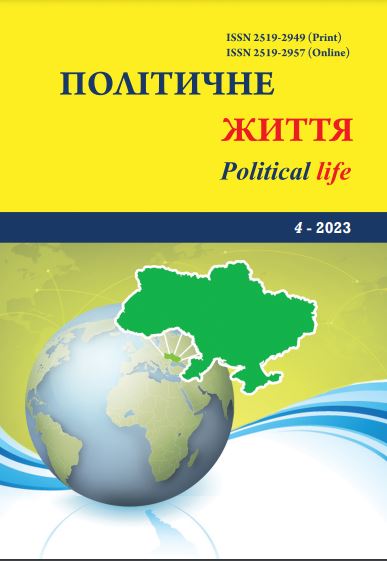The elephant of blind pundits: political propaganda in an infinity of dimensions
DOI:
https://doi.org/10.31558/2519-2949.2023.4.13Keywords:
propaganda; legitimization; identity; mythology; ideology; communication; public diplomacy; electronic diplomacy; political psychology; hermeneuticsAbstract
The relevance of the research topic is due to the scientific myopia of researchers who focus on certain aspects of propaganda and unjustified explanation of the propaganda nature based on extrapolation of its individual dimensions to the interpretation of propaganda as a whole. The dialectic of political propaganda is that its essence determines the infinity of its dimensions and manifestations, which are constantly multiplying, and the multiplicity of its dimensions and manifestations infinitely expands its essence. The purpose of the study is to comprehend political propaganda as a set of its various dimensions and manifestations that determine its multidimensional and inclusive nature. The results of the study are the identified and characterized manifestations and dimensions of political propaganda. The authors summarize their research in the conclusion. Propaganda is synonymous with spiritual power, which binds the ideas, thoughts, desires, intentions and actions of social actors into a single space of domination and subordination in anticipation of promised satisfaction. True propaganda is hidden and invisible to its recipients, but omnipresent. Political propaganda is everything that effectively serves the interests of the government, i.e., ensures the voluntary subordination of social actors to the ruling forces, contrary to their own life values, ideals and objective needs. Propaganda is implemented in both domestic and foreign policy. It is unlimited in its manifestations, dimensions, methods and goals. With the help of such a research method as hermeneutics, the authors managed to «catch» it in such forms of manifestation as spiritual colonization, soft power, legitimization, subtle seduction, construction of significance, ideologization, nominalization, mythologization, symbolization, ritualization, emotionalization, public and electronic diplomacy, confrontation between enemies and friends, dispute of narratives, post-truth, an instance of communication and an instrument of national security.
References
Висоцький О.Ю. Публічна дипломатія: конспект лекцій. Частина 1. Дніпро: Охотнік, 2020. 56 с. URL: https://www.twirpx.com/file/3102044/ (дата звернення: 24.11.2023).
Висоцький О.Ю. Постправда: концептуальні та праксеологічні виміри. Науково-теоретичний альманах Грані. 2018. 21(10). С. 127-132. DOI: https://doi.org/10.15421/1718138.
Висоцький О.Ю. Електронна дипломатія як інструмент пропаганди. Політологічний вісник. 2018. № 81. С. 51-59. DOI: https://doi.org/10.17721/2415-881x.2018.81.51-59.
Высоцкий А.Ю. Проблема легитимации политики в концепции Макса Вебера. Науково-теоретичний альманах Грані. 2003. 6 (32). C. 132-136. URL: https://grani. org.ua/index.php/journal/issue/view/29/27 (дата звернення: 24.11.2023).
Дворецкий И.Х. Латинско-русский словарь. Около 50 000 слов; изд. 2-е, переработ. и доп. М.: Русский язык, 1976.
Дубов Д.В., Баровська А.В., Каздобіна Ю.К. Деструктивні впливи та негативні наративи: інструменти виявлення та протидії. Київ: УФБС, 2020. URL: https://ufss.com.ua/wp-content/uploads/2020/03/ UFSS_MediaLiteracy.pdf (дата звернення: 24.11.2023).
Калиновський Ю., Жданенко С. Роль цивілізаційно-ціннісних наративів у глобальному інформаційному протиборстві. Вісник НЮУ імені Ярослава Мудрого. Серія: Філософія, філософія права, політологія, соціологія. 2023. 3(58). C. 23-37. DOI: https://doi.org/10.21564/2663-5704.58.285630.
Кодекс законов царя Хаммурапи. Хрестоматия по истории древнего мира /Под ред. В.В.Струве. Т. I. Древний Восток. М.: Государственное учебно-педагогическое издательство министерства просвещения РСФСР, 1950. С. 149-176.
Bjola С. Propaganda as reflexive control: the digital dimension. Countering online propaganda and extremism: the dark side of digital diplomacy / edited by Corneliu Bjola and James Pamment. Abingdon, Oxon; NY: Routledge, 2019. P. 13-27.
Laskin A.V. Defining propaganda: Apsychoanalytic perspective. Communication and the Public. 2019. 4. P. 305-314. DOI: https://doi.org/10.1177/2057047319896488.
Liu H. Propaganda: ideas, discourses, and its legitimization. Abingdon, Oxon; NY: Routledge, 2020.
Macleod A. Propaganda in the Information Age: Still Manufacturing Consent. London; NY: Routledge, 2019.
Magnusdottir R. Enemy Number One: The United States of America in Soviet Ideology and Propaganda, 1945-1959. New York: Oxford University Press, 2019.
Till C. Propaganda through ‘reflexive control’ and the mediated construction of reality. New Media & Society. 2020. P. 1-17. DOI: https://doi.org/10.1177/1461444820902446.
Van Herpen M.H. Putin’s Propaganda Machine: Soft Power and Russian Foreign Policy. Lanham (Md.): Rowman and Littlefield, 2016.
Vysotskyi O. National Security Technologies in the Domestic and Foreign Policy of the State. Scientific and Theoretical Almanac Grani. 2023. 26(3), P. 126-133. DOI: https://doi.org/10.15421/172358.
Vysotskyi O., & Pavlov D. Spaces of propaganda as structural and functional dimensions of its deployment in domestic politics and in the international arena. Philosophy and Political Science in the Context of Modern Culture. 2020. 12(1), P. 114-122. DOI: https://doi.org/10.15421/352013.
Vysotskyi, O., Pavlov, D., Ishchenko, I. Propaganda technologies as tools of legitimation of political power. Dilemas Contemporáneos: Educación, Política y Valores. 2019. Supplement, Vol. 7. P. 1-17. DOI: https://doi.org/10.46377/dilemas.v31i1.1212.
Vysotskyi O., Vysotska O. Technologies of Public Diplomacy: Methodological Principles and Practical Potential. Epistemological studies in philosophy, social and political sciences. 2020. 3 (1). P.139-147. DOI: https://doi.org/10.15421/342015.
Winter Ch. Redefining ‘Propaganda’: The Media Strategy of theIslamic State. The RUSI Journal. 2020. P. 1-6. DOI: https://doi.org/10.1080/03071847.2020.1734321.

